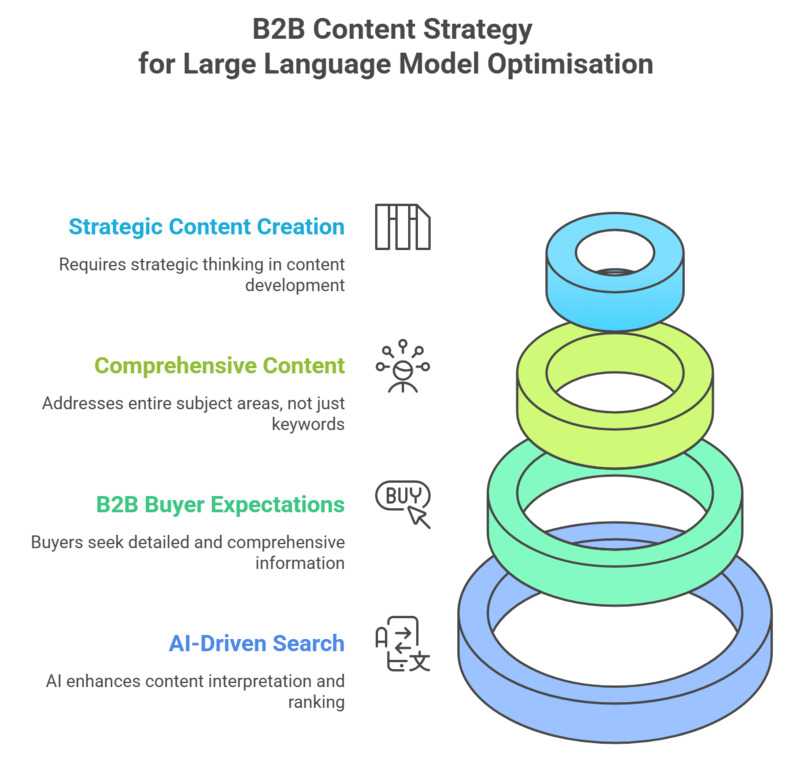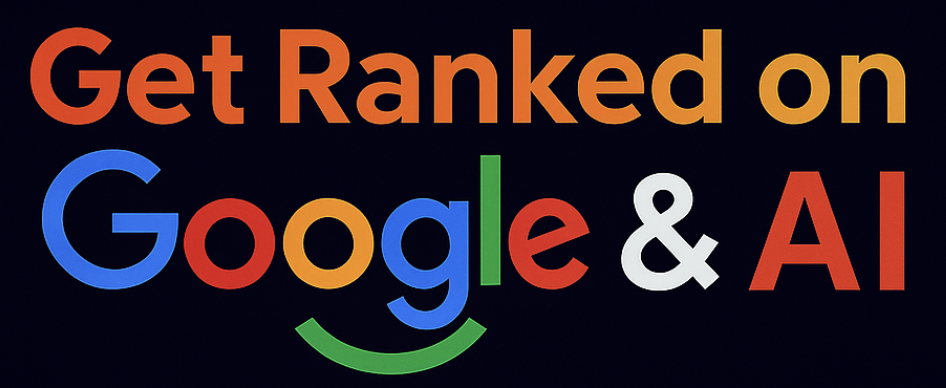The search landscape has undergone a seismic shift. Traditional SEO practices that once guaranteed visibility are rapidly becoming obsolete as B2B AI driven search Malaysia transforms how potential customers find and evaluate business solutions.
Google AI Overviews and other AI search engines now dominate the search experience, fundamentally changing how B2B buyers discover and research products.
This transformation affects every aspect of B2B marketing, from initial awareness to final purchase decisions. Companies that fail to adapt their SEO strategies risk becoming invisible to their target audience.
Table of Contents
How AI Overviews Are Reshaping Search Results

AI overviews now appear prominently at the top of search results, providing comprehensive answers synthesised from multiple sources. These Google AI overviews utilise large language models to understand complex queries and deliver relevant information directly to users.
The implications for B2B brands are profound:
- Zero-click search experiences satisfy user queries without requiring clicks to individual websites
- Gemini AI and similar technologies prioritise authoritative, well-structured content
- AI search results favour websites with strong data foundation and proper schema markup
Consider how decision makers now search for business solutions.
Instead of typing “CRM software,” they ask detailed questions like “What features should a manufacturing company prioritise when selecting a CRM system?” These conversational queries require a completely different SEO approach.
If your businesses are looking to capitalise on the power of Google Ads, optimising your ads for AI-driven search results is crucial.
Our Google Ads services help ensure your brand stands out in the AI landscape, driving high-quality leads directly to your business.
Why Large Language Models Demand Better B2B Content

Artificial intelligence has transformed how search engines interpret and rank content. Large language models excel at understanding context, intent, and relationships between concepts.
This advancement particularly benefits B2B companies because their target audience typically conducts thorough research before making purchasing decisions.
B2B buyers now expect comprehensive answers to complex questions. They want detailed comparisons, implementation guides, and industry-specific insights. AI-powered search systems reward websites that provide this depth of information through well-organised topic clusters.
The traditional approach of targeting individual keywords has given way to comprehensive thought leadership content that addresses entire subject areas. This shift requires B2B marketing teams to think strategically about content creation and organisation.
Essential Strategies for AI Search Visibility
As AI-driven search becomes the norm, SEO strategies must prioritise authoritative, well-organised content and robust structured data. Building deep topical authority helps AI index more effectively, giving brands a distinct advantage in search visibility.
1. Build Comprehensive Topic Authority
Creating isolated blog posts targeting specific keywords no longer suffices. AI search engines favour websites that demonstrate comprehensive knowledge across entire subject areas. Develop content clusters that cover topics from multiple angles:
Core Topic: DIgital Marketing
- Implementation guides for different industries
- Compliance requirements and regulations
- Threat assessment methodologies
- Cost-benefit analyses
This approach helps establish your website as the definitive resource that generative ai tools will reference when synthesising answers.
2. Optimise for Answer Synthesis
Answer synthesis requires content structured specifically for machine consumption. AI visibility depends on how easily algorithms can extract and utilise your information. Key formatting principles include:
- Use clear H2 and H3 headings that answer specific questions
- Provide concise definitions followed by detailed explanations
- Include bullet points and numbered lists for key information
- Create comparison pages that directly address common evaluation criteria
Microsoft’s documentation serves as an excellent example of AI-friendly formatting, with clear headings and structured information that chunk-level retrieval systems can easily process.
3. Implement Advanced Structured Data
Schema markup acts as a translator between your content and AI systems. Structured data helps AI search engines understand context, relationships, and the purpose of your content. Essential schemas for B2B companies include:
| Schema Type | Purpose | B2B Application |
| FAQPage | Common questions | Product queries, troubleshooting |
| HowTo | Step-by-step guides | Implementation processes |
| Product | Service descriptions | Feature comparisons |
| Organisation | Company information | Authority building |
Proper implementation of data governance principles ensures consistency across all structured data elements, improving AI search visibility significantly.
4. Create Multi-Modal Content Experiences
Modern user intent often involves multiple content formats. Self-service experiences require diverse content types that address different learning preferences and use cases:
- Video tutorials for complex procedures
- Infographics for data visualisation
- Audio content for busy professionals
- Interactive tools and calculators
B2B ecommerce platforms particularly benefit from rich product data that supports various content formats. Comprehensive content marketing strategies should incorporate multiple formats to maximise reach and engagement.
a. Focus on the Complete Buyer Journey
B2B content must address every stage of the buyer journey. LLM-driven results often synthesise information from multiple sources to provide comprehensive answers. Your content strategy should include:
| Stage | Content Types |
| Awareness Stage | – Problem identification guides – Industry trend analyses – Educational resources |
| Consideration Stage | – How-to guides for evaluation processes – Feature comparison matrices – Implementation case studies |
| Decision Stage | – ROI calculators – Implementation timelines – Support and training resources |
Our SEO Services help businesses like yours optimise their website and content to meet the demands of AI-powered search engines, improving your overall search visibility and lead generation.
The New B2B SEO Scorecard: Measuring What Really Matters to AI
Traditional metrics like keyword rankings provide limited insight into AI-era performance. Focus on metrics that reflect actual business impact:
- Search visibility across topic clusters rather than individual keywords
- Brand mention frequency in AI-generated responses
- Quality of leads generated through generative engine optimisation
- Engagement depth across content clusters
Traditional SEO metrics remain important but should be evaluated alongside AI-specific performance indicators. Tools that track visibility in AI-generated responses provide valuable insights into content effectiveness.
Companies investing in comprehensive AI SEO optimisation strategies often see improved performance across all metrics, as AI-friendly content typically provides better user experiences overall.
Take Action on Your SEO Transformation
The shift towards AI-driven search represents both a challenge and an opportunity. B2B brands that embrace this change early will establish competitive advantages that become increasingly difficult to overcome.
Start by auditing your current content against AI-friendly criteria. Identify gaps in topic coverage and prioritise content localisation efforts that address specific market needs.
Consider partnering with specialists who understand both technical SEO requirements and B2B marketing dynamics, for instance Newnormz, a digital marketing agency.
Ready to transform your B2B SEO strategy for the AI era?
The time for gradual change has passed. Contact Newnormz to discuss how we can help you achieve sustainable visibility in an AI-driven search landscape.






